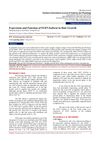136 citations,
July 2014 in “Proceedings of the National Academy of Sciences of the United States of America” FGF5 gene mutations cause unusually long eyelashes by affecting hair growth regulation.
50 citations,
February 2013 in “BMC evolutionary biology” Cetaceans lost hair due to changes in the Hr and FGF5 genes.
47 citations,
June 2017 in “The FEBS journal” Disabling the FGF5 gene in sheep leads to longer wool.
 42 citations,
September 2015 in “Gene”
42 citations,
September 2015 in “Gene” FGF5s can block the effects of FGF5, which may help control hair growth in cashmere goats.
 27 citations,
February 2017 in “Clinical, Cosmetic and Investigational Dermatology”
27 citations,
February 2017 in “Clinical, Cosmetic and Investigational Dermatology” New compounds were found to help increase hair growth and decrease hair loss.
 23 citations,
May 2020 in “Cell Death and Disease”
23 citations,
May 2020 in “Cell Death and Disease” Blocking the FGF5 gene in sheep leads to more fine wool and active hair follicles due to changes in certain cell signaling pathways.
23 citations,
March 2019 in “Gene” Editing the FGF5 gene in sheep increases wool length, confirming its role in hair growth.
 15 citations,
February 2021 in “Scientific Reports”
15 citations,
February 2021 in “Scientific Reports” RNA aptamers can specifically block FGF5-related cell growth, potentially treating related diseases or hair disorders.
11 citations,
October 2014 in “Gene” Researchers identified a new variant of the FGF5 gene in sheep that affects hair length.
 9 citations,
July 2021 in “Frontiers in Pharmacology”
9 citations,
July 2021 in “Frontiers in Pharmacology” Cholesterol-modified siRNAs targeting certain genes increased hair growth in mice.
7 citations,
June 2017 in “Gene” Overexpression of FGF5s makes Chinese Merino sheep grow longer and heavier wool.
 1 citations,
February 2021 in “Scholars international journal of anatomy and physiology”
1 citations,
February 2021 in “Scholars international journal of anatomy and physiology” Different forms of FGF5 either promote or inhibit hair growth.
Editing the FGF5 gene in sheep increases fine wool growth.
FGF5 spliceosomes inhibit rabbit hair growth by affecting gene expression.
 July 2023 in “Indian Journal of Animal Health”
July 2023 in “Indian Journal of Animal Health” FGF-5 promotes Cashmere goat hair growth by increasing keratin genes and reducing certain LncRNA and target genes.
December 2020 in “Research Square (Research Square)” A genetic change in the FGF5 gene affects hair growth in cashmere goats.
 August 2019 in “Research Square (Research Square)”
August 2019 in “Research Square (Research Square)” Certain long non-coding RNAs in cashmere goats affect hair growth when treated with a specific growth factor.
Melatonin increased the activity of a hair growth gene in Cashmere goats.
Certain genetic variations are linked to hair loss in Mexican men.
January 2020 in “Global dermatology” The growth factor cocktail significantly increased hair growth in patients with androgenetic alopecia.
January 2020 in “프로그램북(구 초록집)” The treatment increased hair growth and thickness in patients with hair loss.
75 citations,
September 2007 in “Journal of Heredity” FGF5 gene mutations cause long hair in domestic cats.
73 citations,
June 2006 in “Animal genetics” The FGF5 gene determines hair length in dogs.
 26 citations,
February 2020 in “Frontiers in genetics”
26 citations,
February 2020 in “Frontiers in genetics” The CORT, FGF5, and CD36 genes are crucial for the cold weather adaptation of Yanbian cattle.
 13 citations,
March 2020 in “Genes”
13 citations,
March 2020 in “Genes” Disrupting the FGF5 gene in rabbits leads to longer hair by extending the hair growth phase.
 375 citations,
February 2006 in “Journal of Cell Science”
375 citations,
February 2006 in “Journal of Cell Science” The document concludes that the hair cycle is a complex process involving growth, regression, and rest phases, regulated by various molecular signals.
 155 citations,
August 2003 in “Journal Of Experimental Zoology Part B: Molecular And Developmental Evolution”
155 citations,
August 2003 in “Journal Of Experimental Zoology Part B: Molecular And Developmental Evolution” Understanding hair growth involves complex interactions between molecules and could help treat hair disorders.
 103 citations,
January 2006 in “Journal of Cell Science”
103 citations,
January 2006 in “Journal of Cell Science” The document concludes that the hair cycle is a complex process involving growth, regression, and rest phases, regulated by various molecular signals.
 64 citations,
March 2017 in “Nature communications”
64 citations,
March 2017 in “Nature communications” Researchers found 63 genes linked to male-pattern baldness, which could help in understanding its biology and developing new treatments.
 36 citations,
September 2011 in “British Journal of Dermatology”
36 citations,
September 2011 in “British Journal of Dermatology” White hair grows thicker and faster than black hair due to higher activity of growth-related genes and proteins.














